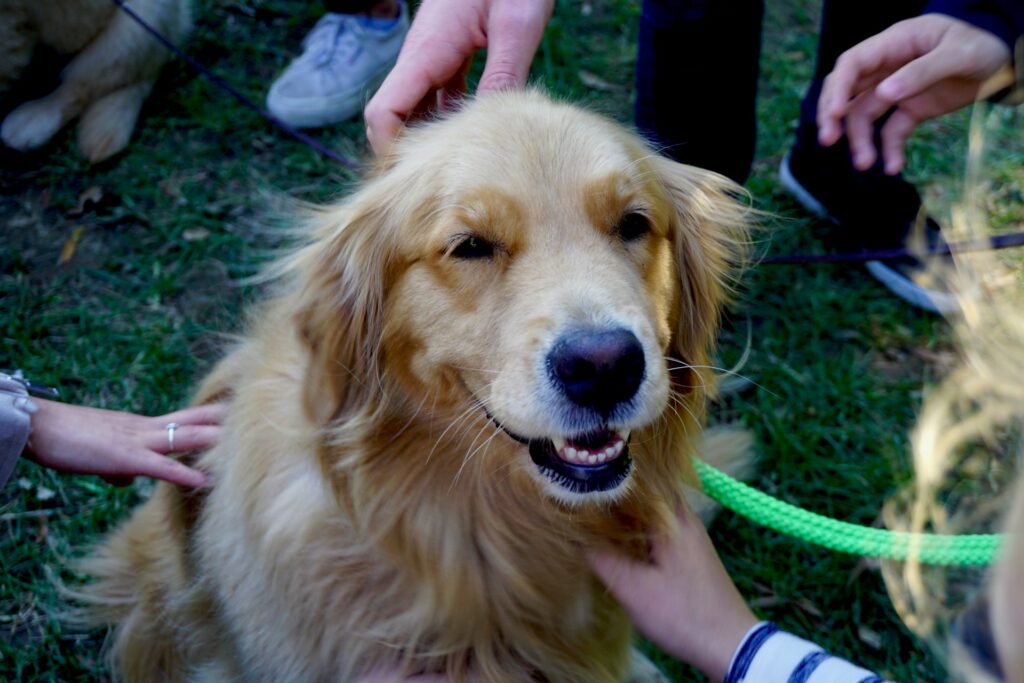
Golden Retrievers are more than just beloved companions—they are life-changers and heroes to millions. When it comes to therapy and assistance, their special blend of trainability, loyalty, and gentle nature sets them apart.
From aiding individuals with disabilities to offering emotional support during times of distress, Golden Retrievers have carved an invaluable niche in the world of service dogs and therapy animals.
This post explores the extraordinary roles Golden Retrievers play in therapy and assistance. We’ll highlight their capabilities, training processes, and the profound impacts they have on the lives of those they serve.
If you’re considering a service dog or are simply a Golden Retriever enthusiast, read on to learn more about these incredible animals.
Understanding the Role of Therapy and Assistance Dogs
Therapy and assistance dogs are trained to perform specific tasks that improve the quality of life for their handlers. Unlike regular pets, they undergo rigorous training to provide both emotional and practical support. The distinction lies in their roles:
- Assistance Dogs: These are service dogs trained to help individuals with disabilities by performing tasks such as guiding the visually impaired, alerting them to medical conditions, or retrieving objects.
- Therapy Dogs: While not specifically trained for disabilities, therapy dogs provide comfort and emotional support in structured settings like hospitals, schools, or disaster zones.
Golden Retrievers excel in both roles because of their temperament, making them one of the most trusted breeds for therapy and assistance work.
Why Golden Retrievers Are Ideal for Assistance Roles
Golden Retrievers are among the top choices for therapy and assistance work, and here’s why:
- Gentle Temperament: Their friendly and calm demeanor makes them ideal companions, especially in high-stress situations.
- Intelligence and Trainability: Golden Retrievers are quick learners, making their training for complex tasks more efficient compared to many other breeds.
- Sense of Loyalty: Their deep bond with their handlers fosters trust, ensuring they provide unwavering support.
- Size and Strength: Their sturdy build makes them capable of performing physical tasks like pulling a wheelchair or offering mobility support.
Golden Retrievers’ innate willingness to please and love for human interaction gives them the edge in therapy and service work. Experts, like those at MyGoldenRetrieverPuppies.com, emphasize these traits as key reasons why this breed thrives in such roles.
Key Applications of Golden Retrievers in Assistance Work
Golden Retrievers are highly versatile when it comes to assisting people. They perform consistently well in several specialized roles:
1. Supporting Individuals with Disabilities
From guiding visually impaired individuals to assisting those with mobility challenges, Golden Retrievers are trained to empower their handlers to live more independent lives. Tasks can include:
- Guiding through crowded areas
- Opening doors or drawers
- Assisting with dressing or undressing
- Picking up dropped items
2. Alerting to Medical Conditions
Golden Retrievers can be trained to act as medical alert dogs for conditions such as diabetes or seizures. Through scent detection, they can warn their handlers of blood sugar changes or an oncoming epileptic episode, giving them time to take preventive actions.
3. Emotional Support and Comfort
Often seen in hospitals, disaster zones, and schools, therapy Golden Retrievers provides emotional relief to individuals undergoing mental or emotional stress. Their soothing presence can reduce anxiety, improve mood, and foster a sense of safety.
4. Trauma and PTSD Assistance
Golden Retrievers assist individuals suffering from Post-Traumatic Stress Disorder (PTSD), particularly military veterans. They’re trained to perform specific tasks like waking handlers from night terrors, creating personal space in a crowd, or providing a calming presence in stressful situations.
5. Autism Support
Golden Retrievers are a popular choice for families of children with autism. These dogs provide companionship, ensure the child’s safety, and help reduce sensory overload in challenging environments.
How Golden Retrievers Are Trained for Therapy and Assistance Work
The road to becoming a fully-trained therapist or service dog is rigorous yet rewarding. Here are the essential stages of training:
- Early Socialization: Breeders, like those at MyGoldenRetrieverPuppies.com, emphasize socializing puppies to expose them to various environments, ensuring confidence and adaptability.
- Basic Obedience Training: Puppies learn foundational commands such as sit, stay, come, and leave.
- Task-Specific Training: Advanced stages focus on teaching the dog to perform specific tasks based on the handler’s unique needs (e.g., retrieving items, guiding, or alerting to medical events).
- Certification: Organizations like Assistance Dogs International (ADI) provide certifications to ensure dogs meet industry standards.
- Handler Integration: Dogs are paired with their handlers and undergo additional training to ensure they work seamlessly together.
Patience, expertise, and consistent positive reinforcement are critical in the training process, shaping Golden Retrievers into exceptional therapists and service dogs.
The Benefits of Golden Retrievers in Therapy and Assistance
Golden Retrievers offer more than just practical support—they provide emotional stability, security, and companionship. Here are some of the key benefits:
- Improved Mobility and Independence: Assistance dogs enable individuals with physical disabilities to regain autonomy in their daily lives.
- Reduced Anxiety and Stress: Emotional support dogs have a calming effect, which is especially beneficial for individuals with PTSD, anxiety disorders, or chronic stress.
- Strengthened Emotional Connections: These dogs foster deep, trusting bonds with their handlers, contributing to a positive mental outlook.
These benefits aren’t just anecdotal. Studies consistently demonstrate the positive impact therapy and service dogs have on the physical and emotional well-being of their handlers.
Building Awareness and Choosing the Right Golden Retriever
If you’re considering a Golden Retriever for therapy or service work, it’s essential to select a dog from a reputable breeder who prioritizes health and temperament.
Websites like MyGoldenRetrieverPuppies.com connect potential owners with responsibly-raised puppies, ensuring optimal traits for future assistance or therapy training.
When selecting a Golden Retriever for these roles:
- Assess Temperament: Work with a trainer or breeder to evaluate the puppy’s temperament.
- Ask for Health Clearances: Reputable breeders provide genetic health guarantees, ensuring a strong foundation for your prospective service dog’s health.
- Research Training Programs: Choose a training program accredited by respected organizations, ensuring the highest standards of preparation.
Empower Lives with Golden Retrievers
Golden Retrievers exemplify the perfect balance of intelligence, temperament, and physical ability, making them unmatched as therapy and assistance dogs.
Their capacity to touch lives—whether by providing comfort, enhancing mobility, or saving lives—reinforces their role as one of the most invaluable breeds for support work.
If you’ve been inspired to learn more about adopting or training a Golden Retriever for therapy or assistance, visit MyGoldenRetrieverPuppies.com to explore your options. Golden Retrievers don’t just brighten lives—they transform them.
Last modified: December 1, 2024








